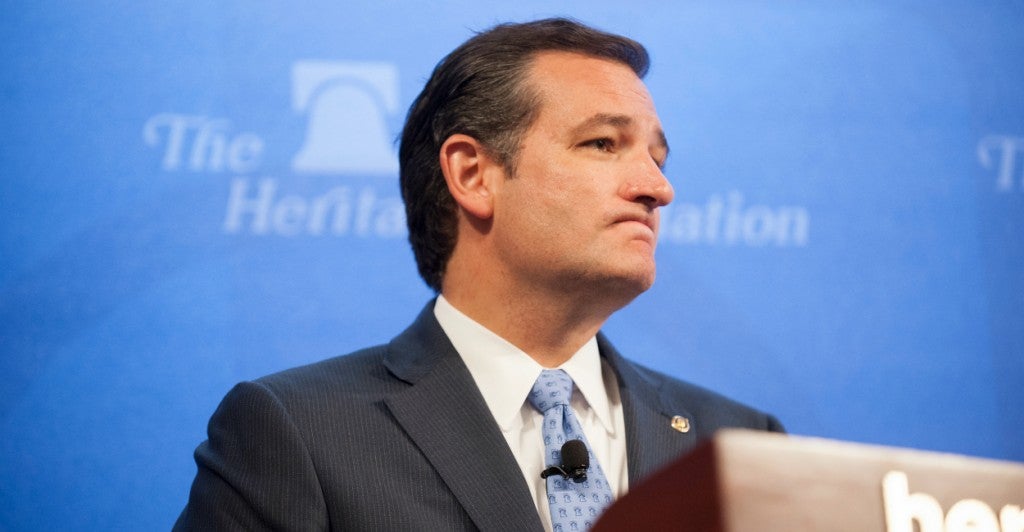Texas Sen. Ted Cruz spoke out today against the cozy relationship between lawmakers on Capitol Hill and corporations’ lobbyists, or what he calls the “Washington Cartel.” He criticized lawmakers with open “ears and wallets” for appeasing special interests while hurting U.S. taxpayers.
“Let me explain to you how it works: A bill is set to come before Congress, and career politicians’ ears and wallets are open to the highest bidder,” he said, speaking at The Heritage Foundation.
“Corrupt backroom deals result in one interest group getting preferences over the other, although you give the other a chance to outbid them. Or, even worse, a very small interest group getting special carve-outs at the expense of taxpayers.”
“And those who don’t oblige,” he continued, “well they are shunned by the cartel, effectively locked out.”
Cruz outlined four specific programs that are engines of the Washington cartel: the Export-Import Bank, sugar subsidies, the Internet sales tax and renewable energy mandates.
The first, Ex-Im, has been a topic of discussion in D.C., since its charter expires June 30. The bank provides taxpayer-backed loans and loan guarantees to foreign countries and companies for the purchase of U.S. products.
With Congress preparing to leave Washington, D.C., Ex-Im is on track to expire. However, it has the backing of large corporations such as Boeing and General Electric—the two biggest beneficiaries of the bank’s financing, respectively. Among members of Congress, Ex-Im is supported by Sens. Maria Cantwell, D-Wash., and Lindsey Graham, R-S.C., who represent states where Boeing has a large presence.
>>> John Kasich on Export-Import Bank: ‘Get Rid of It’
Those who oppose the bank, including Cruz, argue the bank furthers cronyism and corporate welfare. Supporters, meanwhile, say it supports jobs in the U.S. and helps small businesses.
“It is hard to imagine an institution that is more emblematic of cronyism than the Export-Import Bank,” Cruz said today. “The Export-Import Bank kills American jobs and often favors foreign investment over American investment.”
Cruz went on to discuss how renewable energy mandates, sugar subsidies and the Internet sales tax raise costs for taxpayers, while providing relief to big corporations and industry leaders.
Renewable energy mandates require utility companies to obtain a certain amount of power from renewable energy sources like wind and solar power. However, many wind and solar companies can benefit from green energy subsidies. Wind credits alone, he said, cost taxpayers upward of $13 billion.
“For decades, the federal government has teamed up with specific industries to pick winners and losers in the energy industry,” Cruz said. “Aside from further complicating an already Byzantine tax code, this type of corporate welfare has only distorted the price of energy and empowered failed companies like Solyndra.”
When speaking about the Internet sales tax, the Texas Republican noted that the Internet has been a boon to small businesses and entrepreneurs, allowing businesses to interact and sell to customers from around the world. However, implementing an Internet sales tax through the Marketplace Fairness Act would hinder those small business owners while helping large corporations.
“We’ve seen the pattern of Washington fairness,” Cruz said. “What is Washington fairness? Hammer the little guy, help the big guy.”
